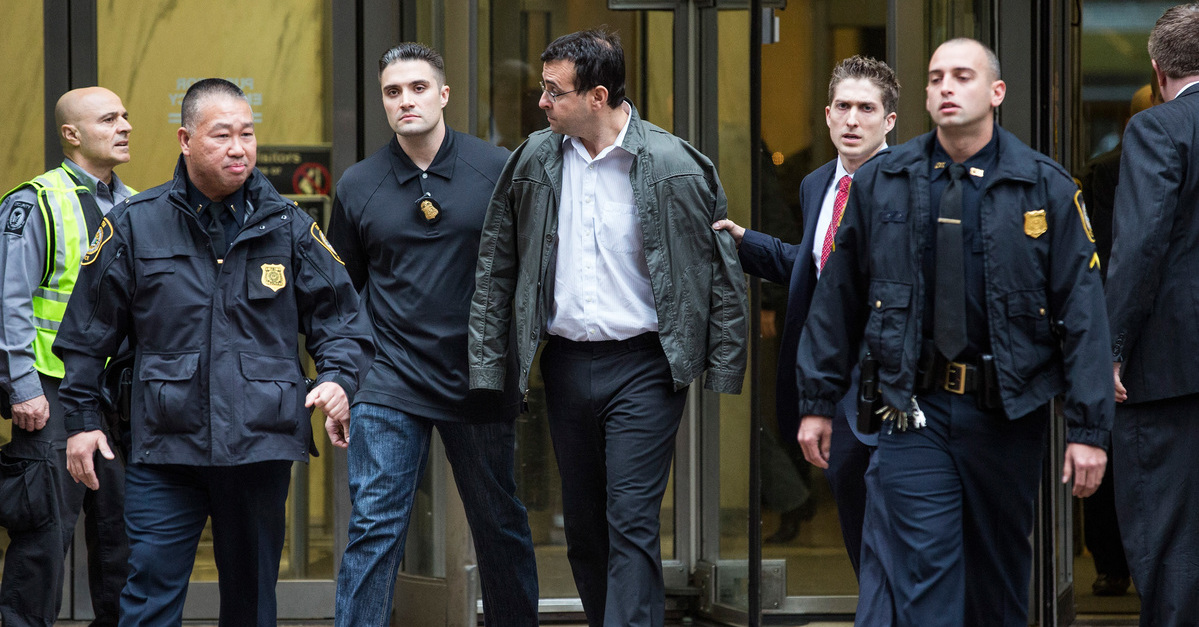
NEW YORK, NY – DECEMBER 17: Attorney Evan Greebel, center, is led by law enforcement officials after being arrested as a co-defendent with Turing Pharmaceutical CEO Martin Shkreli for securities fraud on December 17, 2015 in New York City. Shkreli gained notoriety for raising the price of Daraprim, a medicine used to treat the parasitic condition of toxoplasmosis, from $13.50 to $750, though the Greebel arrest did not involve that price hike.
“Pharma Bro” Martin Shkreli‘s former lawyer has been allowed to resign from practicing law in New York State.
Evan Louis Greebel, a former attorney with the law firm of Katten Muchin Rosenman LLP, received permission to voluntarily “resign as an attorney and counselor-at-law” from the Supreme Court of the State of New York, Appellate Division, Second Judicial Department in a Wednesday order “in lieu of further proceedings in connection with his conviction” on securities fraud charges in December 2017.
Greebel was previously sentenced to 18 months in federal prison after an 11-week-long trial in which prosecutors referred to him as a “corrupt lawyer” in connection with his role in Shkreli’s efforts to defraud pharmaceutical company Retrophin, Inc. to pay off family debts. The duo was accused of working together in order to use Retrophin’s cash and shares in order to stave off investors in Shkreli’s failed hedge funds.
The now-former attorney made note of the extent and seriousness of his criminal activity in the Wednesday court order.
The combination farewell/mea culpa document reads:
[Greebel] acknowledges in his affidavit that he is currently the subject of an investigation by the Grievance Committee for the Ninth Judicial District, and that the allegations include at least the following acts of professional misconduct: Upon a jury trial in the United States District Court for the Eastern District of New York, on December 27, 2017, he was found guilty of conspiracy to commit wire fraud and conspiracy to commit securities fraud, and on August 17, 2018, he was sentenced, inter alia, to 18 months’ imprisonment on each offense, to be served concurrently, followed by 3 years of supervised release. The respondent further acknowledges that his convictions constitute “serious crimes” under JudiciaryLaw § 90(4) and constitute a finding of misconduct under the Rules of Professional Conduct, requiring the imposition of discipline. He attests that he cannot successfully defend against these facts and circumstances.
In other words, Greebel agreed that he was convicted of federal crimes and has no defense against the allegations made against him by law enforcement. Those allegations led to a conviction which in turn led to an inquiry into Greebel’s professional conduct. But the court’s order said the professional conduct inquiry into Greebel did “not include any allegations that he willfully misappropriated or misapplied money or property.” In other words, the professional conduct matter appeared to be more concerned with the fact that a conviction occurred than it did with the underlying substance of the conviction.
By allowing Greebel to resign, the committee’s professional conduct investigation is now canceled.
“The Grievance Committee contends that the resignation fully complies with the requirements of 22 NYCRR 1240.10 and, therefore, recommends its acceptance,” the decision notes. “In view of the respondent’s disbarment, on the Court’s own motion, the hearing before the Special Referee, as directed by decision and order on motion of this Court dated May 26, 2020, is discontinued.”
The intermediate appellate court’s decision to grant Greebel’s resignation means he is immediately disbarred and his name is being “stricken from the roll of attorneys and counselors-at-law.”
A separate request from Greebel to have his name stricken retroactively from “the date he ceased practicing law, March, 1, 2016, or alternatively, the date of his conviction, or alternatively, the date of his interim suspension [in 2019]” was denied.
The order is silent as to whether or not Greebel may some day be able to reapply for readmission to the bar. New York law appears to allow reapplications for admission in some cases of resignation after seven years.
Read the court’s full order below:
[image via Andrew Burton/Getty Images]